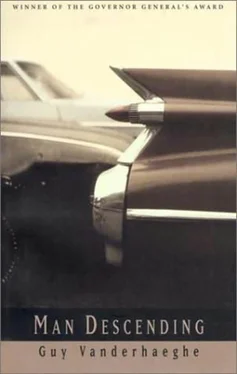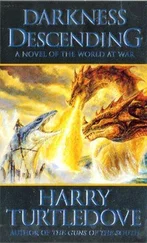Krantz had hauled himself upright and was staring at him with a bemused look on his face.
“Hey, Krantz,” yelled Ogle, “look at the world-famous bicycle racer sweep up the cobbled streets of Monte Carlo.”
“Give her shit!” shouted Krantz gleefully.
Ogle jacked his butt in the air and began to really pump.
“Yahoo!” yelled Krantz, wobbling.
Ogle was determined to teach that leg its duty. But he did not feel one hundred per cent. He was not up to snuff. So when the therapist arrived with the security guard they found Krantz calling for help and Ogle in convulsions on the floor, his legs rhythmically drawing up and thrusting out again, like a galvanized frog on a laboratory table, swimming to God only knows what destination.
They opened his skull and took a look. The tumour was sequestered in the folds of the brain lobe in such a way that the surgeon lost all confidence in his scalpel. So they closed him up again and wheeled him back to the ward. The doctors wished to let the tumour “ripen.” The very word led Ogle to imagine button mushrooms swelling in the humid night of some hothouse. He lay in his bed with his head swathed in yards of gauze, his eyes hooded, seldom speaking.
Morissey, perhaps heartened by what he surmised were signs of Ogle’s imminent demise, took to conversation.
“You know what you put me in mind of?” he asked.
“A corpse.”
“Oh, Jesus, what a thing to say,” said Morissey cheerfully. “Nah, a what-you-call-it? A Hindu with a thingamajig – a turbine.”
“Is that right?” said Ogle flatly.
“Yeah, there’s one of them in here. A real black bugger with the washing wrapped around his head – a doctor.”
“I’m tired,” said Ogle. “I’m going to sleep now.”
“Sure,” said Morissey. “Keep up your strength.”
But Ogle didn’t even go through the pretence of dropping off. He neglected even to close his eyes. Instead he stared at the ceiling very hard and tried to remember what had gone through his mind during those convulsions. There had been something. He had been sure.
David tried to coax Ogle out of his depression. He described for him the glories of the Holy Land: a purifying sun like hot glass; the salinity of the Dead Sea; the holiness of the learned rabbis of Jerusalem – all as if Ogle were as ardent and as hopeful a prospective pilgrim as he. He stole a minute here, a minute there, to sit by Ogle’s bed, to smoke a cigarette and extol the virtues of the Expos. Ogle’s smokes had been taken away from him because he didn’t have full control of his limbs and the nurses were afraid he would drop a cigarette and set the bedclothes on fire. So David shared his butt, holding it for him and allowing him an occasional drag that lent Ogle’s face some of the beatific splendour of a nursing baby’s.
David discovered that Ogle had the rudiments of chess, so on the night shift when things were slow they would play a game on David’s little magnetic travelling board. The red head bobbed and weaved above the checkered square; his fingers snapped; he hummed the overture from The Nutcracker . His body writhed, and like a Hassid lost in the ecstasy of holy dance, he was transported. David was happy amidst the smell of stale urine, soiled bedclothes, fevers and agonies.
Ogle was not.
Sometimes he found himself in tears. David would pat his shoulder with a large, freckled hand, with bright, virile tufts of red hair on the knuckles. “There, there,” he would say, and on the next move gratuitously surrender a knight to Ogle.
Once Ogle threw the chessboard against the wall in a fit of petulance at losing once again. “That’s it,” he said, burning with humiliation. “I’m finished with this goddamn game. Never again. There’s no point in it. That’s it.”
David patiently picked the pieces off the floor and tidily stowed them in the board, which also folded into a case. One of the hinges of the case was bent from hitting the wall. The lid wouldn’t close.
David looked at him reproachfully. “It doesn’t close,” he said.
“I don’t give a shit,” said Ogle, beginning to cry. “Do you think I give a shit about your christly chess case?”
“You are always causing trouble now,” said David. “Why don’t you behave like a gentleman? Yesterday you wet the bed. There is no reason for that. You are turning into an exhibitionist.”
“I’m turning into a vegetable! A fucking vegetable!” shouted Ogle. “And nobody cares! Nobody does anything!”
“Did you ever consider that there is nothing to be done?” said David, grasping the chess case to his smock with both hands.
“Something can be done!” shouted Ogle. “Something can always be done!”
“Perhaps,” said David.
“Yes,” said Ogle, “yes, yes, yes.”
David came to the bed. “Tom,” he said, “be quiet. Get some rest.”
“You shit,” said Ogle. “You can do something for yourself. I can’t. Why don’t you bugger off to Israel? You’re always yapping about it. Take the bull by the horns.”
“It’s not possible,” said David.
“Oh God,” said Ogle. “I can’t feel my toes. I can’t feel my toes.”
“Be calm,” said David. “Calm down.”
“Like him,” said Ogle, pointing to Morissey sleeping a heavy, drug-induced sleep. “Calm like him. I’m not croaking like that bastard. Not in my sleep. Not yet.”
“You shouldn’t carry on this way,” said David.
“Why shouldn’t I?” yelled Ogle. “This whole business has left one bad taste in my mouth. Your doctors, your hospital, everything.”
David smoothed his trousers on his knee. “Please,” he said earnestly, “don’t be bitter. It doesn’t help.”
“It doesn’t hurt,” said Ogle. “I didn’t live twenty-eight years to end up like this – a slab of meat.”
“All right,” said David, “I won’t argue with you. But let me tell you a little story. Some time after the war – 1947 – I ended up in London. I lived with a Jewish tailor in the East End for a little while. I was very unhappy, very bitter. He left me to myself for a long time and then one day he told me a kind of parable. He said there were two kinds of bitterness: one that takes away the appetite and one that stimulates it. Pepper, he said, was of the first kind – it burns the tongue and nothing more. But horse-radish, though bitter, sharpens the hunger and makes a man impatient for the good things of the meal. So, he said, if a man becomes only bitter and downcast he goes no further. But a little bitterness, a little horse-radish, may give one an appetite for perfection.”
“How quaint,” said Ogle, “how undeniably folksy.”
David shrugged and stood up.
“You haven’t told me,” Ogle said, “why, with all your good advice, you’re still here and not in Israel? Physician, heal thyself.”
“Why? Because I fell in love with and married a gentile,” said David. He laughed. “She won’t go. She was born here. This is home to her. So I suppose you could say that I have been forced to make the best of things. I had no choice about acquiring a taste for perfection. Besides, there are no Expos in Israel.”
When it came time to clean his room according to the rotation schedule, Ogle found himself parked in the hallway in a wheelchair along with the other non-ambulatory patients. The walking wounded headed immediately for the television lounge.
Ogle sat in the hallway. He hadn’t been shaved that morning and he scrubbed his beard with his hands. He enjoyed the tingling sensation in his palms. Ogle found that his hands were growing more insensitive with every passing day, and so he was constantly rubbing, battering and thumping them against any surface that would render up some feeling.
Читать дальше












